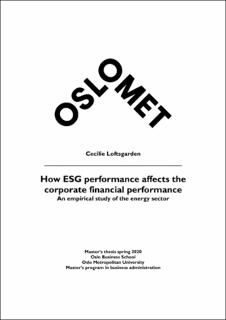How ESG performance affects the corporate financial performance. An empirical study of the energy sector
Master thesis
Submitted version
Permanent lenke
https://hdl.handle.net/11250/2824492Utgivelsesdato
2020Metadata
Vis full innførselSamlinger
Sammendrag
This thesis investigates the relationship between environmental, social, and governance
(ESG) performance, corporate financial performance (CFP), and firm value by focusing on
the energy sector. For this purpose, the study uses a panel dataset comprising of 116 listed
firms and 928 firm-year observations during the period 2012 – 2019. The energy sector
comprises of two industries and the results indicate that the two industries are affected
differently when engaging in ESG. The companies in the oil, gas – and consumable fuels
industry is affected positively towards the financial performance, while energy equipment and
services are affected negatively. The results from the pillars suggests that the social pillar is
affecting financial performance the most, and the governance pillar is second most affecting.
However, it is indicated that the pillars also had a negative association to financial
performance. When looking at the current study in the context of theories, it is in line with the
instrumental stakeholder theory, regarding the relationship between ESG and financial
performance. It also found evidence that can relate the current study in the context of the
slack resources theory and managerial opportunism hypothesis, when exploring the
relationship between financial performance and ESG. The aim of the current research study
is to provide a broader perspective on ESG and financial performance, investigate how ESG
is reflected in value generation and contribute with important and valuable information which
can be beneficial to government, investors and business managers.
